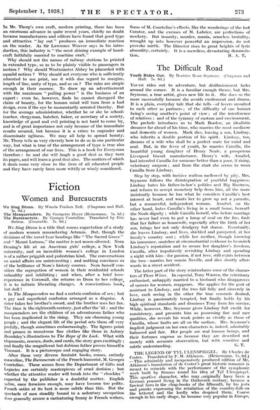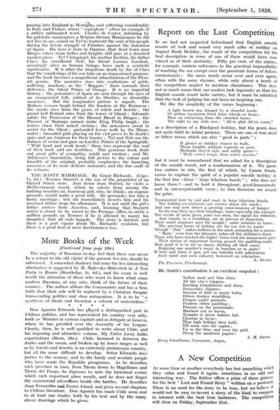THE LEGEND OF TYL ULENSPIEGEL. By Charles de Coster. Translated
by F. M. Atkinson. (Heinemann. 7s. 6d.) —This admirably and inexpensively produced edition of Mr. Atkinson's translation of de Coster's great historic romance is meant to coincide with the performance of the symphonic work built by Strauss round his idea of Tyl Ulenspiegel. This sportive character, who may .originally have been a German peasant living in the thirteenth century, became a farcical hero in the chap-books of the fifteenth, by his jests and pranks expressing the retaliation of the country-folk on the lettered and the lordly who despised them. Coarse enough in his early shape, he became very popular in Europe,
passing into England as Howlglas, and softening considerably in Italy and France, where espieglerie " offers an example of a rather sublimated word. Charles de Coster, initiating by his patriotic masterpiece a Belgian literary Renaissance he did not live to see, seized on Tyl to represent the soul of his people ' during the heroic struggle of Flanders against the dominion - of Spain. His hero is born in Damme, that dead town near Bruges where stone ladies and knights still gaze at a deserted market-place. Tyl Ulenspiegel, his mother Soetkin, his father Claes, his sweetheart Nele, his friend Lamme Goedzak, amazingly alive as human beings, have each a symbolic significance. It is after•the iniquitous death by fire of Claes that the wanderings of his son take on an impassioned purpose, and the book becomes a magnificent adumbration of the Flem- ish genius. The narrative rises into exaltations of pride, suffering, mockery, as the " Beggars " draw towards their deliverer, the Silent Prince of Orange. It is no impartial history ; the potentates of Spain are seen through the eyes of an exasperated folk, robbed of its liberties, as dreamlike monsters. But the imaginative picture is superb. The Rubens women laugh behind the feasters at the Kermesse ; the smoke rises from the pyres of witch and heretic ; the proud bell Roland cries from the tower of Ghent ; falconets . salute the Procession of the Blessed Blood in Bruges ; the . Provost of Madcaps cannot make King Philip laugh ; the reiters chase their naked victims ; the armourers sweat in secret for the Silent ; garlanded lovers walk by the Minne- water ; brocaded girls playing on the viol prove to 13e death's spies and are forgiven for their beauty ; Tyl and Nele use the balsam of vision and gaze on Lucifer, Prince of the Springtide. " Wild head and weak heart," these two represent the soul of their land, and are deathless. This generous book deals out great gifts of sympathy, mirth and wisdom ; and Mr. Atkinson's translation, doing full justice to the colour and breadth of the original, probably emphasizes the haunting sweetness of its more delicate moments, and the fine craft of its refrains.































 Previous page
Previous page